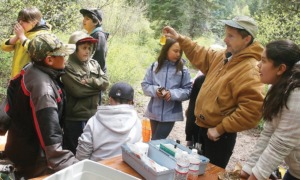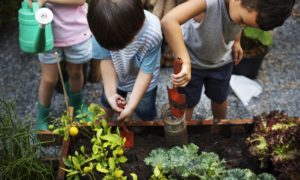About 100 high school youth from community and out-of-school organizations gathered along with their adult allies in Greensboro, North Carolina, this past weekend for a conference on food systems and inequality.
Sponsored by the Rooted In Community National Network, it focused on issues ranging from environmental degradation to lack of access to healthy food to poor working conditions in agriculture. Rooted in Community encourages young people from low-income and historically excluded communities to develop skills to take leadership for food justice, according to the organization.
Dimitrius Eliza, a recent high school graduate, came from Camden, New Jersey.
“Camden is a food desert,” he said.
“There’s a ton of corner stores,” he said, but only one supermarket in the area.
He said it is far easier for people to find a honey bun and a drink at a corner store than find transportation to a full grocery store.
He works at the Center for Environmental Transformation, where he teaches other youth about gardening, cooking and nutrition. The center has an urban garden, a program for children and offers job training for youth.
Eliza said he is also concerned about pollution in his hometown — air pollution from a trash incinerator only a quarter-mile from his home and water pollution from the city’s aging sewer system. These problems aren’t getting people’s attention, he said.
“I feel like we’re being overlooked a lot,” he said.
The 19th annual Rooted in Community National Youth Leadership Summit, which draws youth from as far away as Canada and the Virgin Islands, offered workshops, field trips and service projects, said Cecilia Polanco. She is a recent graduate of the University of North Carolina at Chapel Hill and led a social media workshop for youth at the conference.
In March, Polanco started a nonprofit food truck venture whose proceeds go to scholarships for undocumented youth.
She’s concerned about Latino food vendors in North Carolina’s Triangle area, whose traditional small businesses have been curtailed by increased regulation.
These vendors have been working in the area for a long time, but the explosion in popularity of food trucks has added new laws, Polanco said. Vendors who might sell from their car trunk at church can’t keep up with the regulations or they can’t communicate because they don’t speak English, she said.
Participants at the conference also visited Transplanting Traditions Community Farm in Chapel Hill, which helps refugee farmers transfer their skills to a new country. In 2016, 8 acres were cultivated by 40 families, according to the organization’s website. Produce is sold at farmers markets and through subscription to individuals.
The farm provides training for adults, internships for refugee youth and has a summer camp for children. Its youth collaborative made a video about the farm in 2014.
Participants visited Stagville Plantation near Durham, North Carolina too. It was one of the largest plantations in the antebellum South with about 900 enslaved people.
“A discussion around food justice can’t be had without talking about race and issues around racial inequality,” Polanco said.
The local group hosting the conference was the Food Youth Initiative, located at Center for Environmental Farming Systems, a partnership of North Carolina Agricultural and Technical State University, North Carolina State University and the state agriculture department.
FOR MORE INFORMATION ON HEALTH & NUTRITION IN OST GO TO THE YOUTH TODAY OST HUB.
This story has been updated.
































